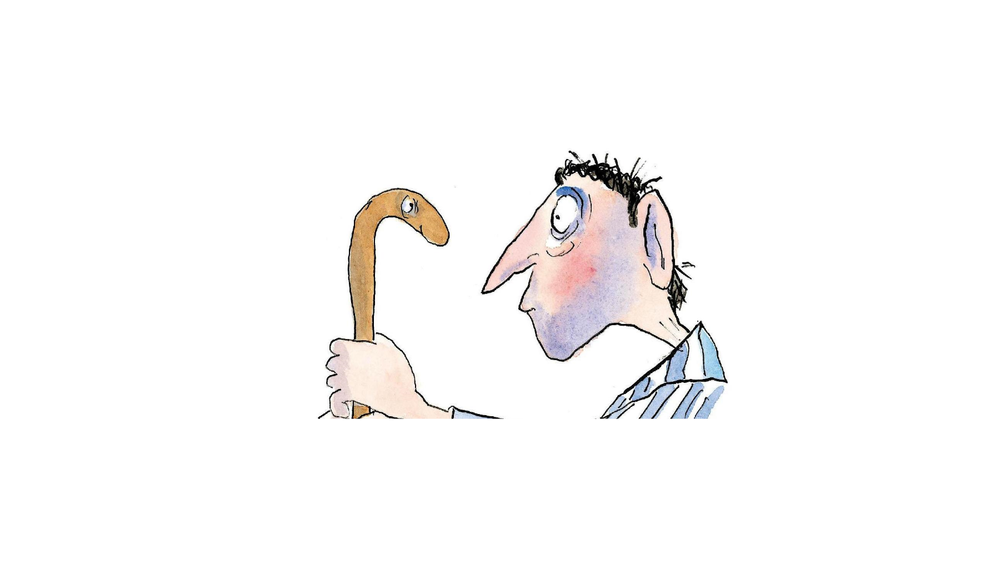Michael Rosen reminds us all that sometimes, the smallest achievements are the most extraordinary
I happened upon a wonderful book this week: a first-person account of an old man’s rehabilitation following a serious illness. I found it at the library and, later in the day, read it to my kids.
The book, written by Michael Rosen and illustrated by Tony Ross, begins with a drawing of a greenish-blue face emerging from a white sheet and the words: “I was ill. I was so ill I couldn’t get up.”
Later, an author’s note will reveal the year—2020—and the illness—Covid-19. Rosen was so sick that doctors had to put him to sleep for 40 days; when he woke he had to learn to walk again.
The second page introduces three masked rehabilitation providers. They come to Rosen’s bedside, tell him it’s time to get up, and lift him from the sheets. He says, “Please let me go back to bed!” They do; he smiles. But the next day they are back—and the next, and the next—to get him up again.
In time they help him learn to walk again. He progresses gradually and comically: he walks with a frame, between bars, with a walking stick and then, at last, without.
Eventually he’s well enough to go home. Suddenly we see he isn’t just a patient—he has a family, a life beyond the hospital, even normal clothes—it’s almost a surprise.
Once home, and with his family watching apprehensively, he climbs the stairs, goes to the loo, and makes a cup of tea—gingerly, but by himself. The story makes it clear this isn’t normal, it is remarkable.
The author’s note at the end, which fascinates the kids—“so it’s all true?”—gives some background on the story before addressing the reader: “Maybe you’ve been ill. Or maybe you know someone who’s been ill. When we’re ill, we change, don’t we?”
I think of the pale ghoulish face peering from a bed on the first page of the story, and the happy granddad pictured later on. They look like different people, but as the story shows, as I hope my children saw, they aren’t.
I put the kids to bed and open my laptop, wanting to know more. I come across a 2021 interview where Rosen describes his rehabilitation experience as so “utterly infantilising” that turning it into a children’s book made sense.
He also talks about how one of the things we’re always saying to children is “try harder”.
“We put in front of them great sporting successes—we’re all watching them now at the Olympics. But I think if I had to list my greatest physical achievements in life, one of them would be learning to walk again this last year. This book is a reminder that there are very, very ordinary achievements that are amazing as well.”
I read this quote aloud to my husband. He suffers from such severe chronic pain that playing with the kids or cooking them a meal is an extraordinary achievement; and to our eldest son, who understands this now—and I manage not to cry.
Later, I share it with a friend who suffered a stroke in his thirties, who is still re-learning ordinary skills years later—and with his wife, who has since become a speech pathologist, who now helps others who have suffered strokes. They are ordinary-amazing too.
It’s refreshing to read a children’s book like this. There are no talking animals, no superheroes, no alternative worlds. There’s just a person stuck in bed who needs some help, and some people who say, “we’re going to get you up”.
They say “See if you can…”, day after day and, day after day, he does.
There’s no dramatic action, just slow transformation. Yes, Rosen gives his walking stick a funny name, his illustrator adds eyes and a mouth, but the magic of the story—for this reader at least—resides elsewhere.
After dedicating the book to his family, Rosen says it’s also for: “all the doctors, nurses, physiotherapists, occupational therapists and hospital workers who saved my life and have helped me get better”. My heart is full.
I can’t decide who the hero of this story is: the character who perseveres, who learns old skills anew, or those who show him how.
It’s a silly question. Of course the answer’s both.
* First published by Spoonie Press in August 2022. The press has since closed and the website no longer exists.
